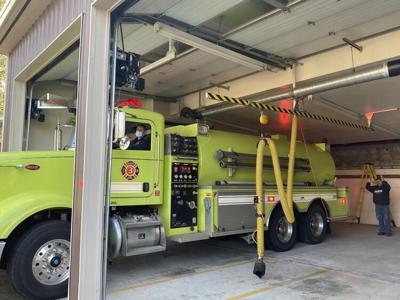WHITE SALMON — The City of White Salmon and Klickitat County Fire District No. 3, which serves the communities of Snowden and Husum, are considering a cooperative agreement between the two fire departments.
What a cooperative agreement between the two districts would look like is unclear for now, but earlier this month, White Salmon city councilors passed a resolution expressing their intention to carry out a study, establish a citizen task force, and create recommendations that would be brought back to council for a vote.
To carry out the study, the city and fire district intend to enter into a cost-sharing agreement and hire consultant Bob Merritt, who is also retired from his position of chief of Fire District No. 3, to perform the study. Merritt, who works as a consultant for mHc Associates, told councilors and fire district commissioners last month during a special joint meeting between the two governing bodies that he helped write legislation that allowed for what are called Regional Fire Protection Service Authorities (RFPSA) and led the first consolidation into an RFPSA involving three cities in 2006, which he said took less than six months to complete.
RFPSAs are a special purpose taxing district in the state of Washington created by a vote of the people residing in the proposed district. A simple majority vote is required to organize the district, but any additional taxes must be approved by a 60% supermajority. These are not the only solution, Merritt noted.
Fire districts in the state of Washington are facing great challenges, Merritt said, including financing operations and improvements in anticipation of growth, meeting the demand for staffing and volunteerism, administrative overload, and unfunded mandates.
The idea to bring the city and the rural fire district into a more formal arrangement is not new, but some jurisdictions in Washington are now considering cooperative agreements as a way to maximize efficiency in response and turnout times, utilize resources to their fullest extent, and allow flexibility to increase or expand emergency services, Merritt said.
Fire District No. 3 Chief Wes Long said that Klickitat County’s fire services do not perform as well when split into over a dozen separate fire districts.
“I believe passionately that we need to understand that we are a community of one. People commute for entertainment, necessities, business and so on,” Long said, adding that as the community prepares for growth in the area, property taxes have steadily declined. Cities and special purpose taxing districts are limited in the amount of property taxes each year to 1% additional taxes, less than average inflation.
Long added that the district has been planning to replace a fire engine, which has been challenging financially for the district.
“We need to be looking into the future financially, operationally, administratively, so we can react and be more viable, provide better, more prompt service, increase the safety of our members through training and needed equipment, comply with the law, reduce risk and liability to both the city and the fire districts through training, policies, equipment,” Long said.
White Salmon cannot afford to pay for a full-time fire chief, Mayor Marla Keethler said, adding that “when we do not pay for the support and services that we’re expecting, we create a false or artificial sense in the community about what they’re getting, and it is preventing capable and potentially willing people from being able to make that decision and still provide for their livelihood.”
Keethler said White Salmon city residents pay those lowest property taxes compared to Bingen and Goldendale residents.
“The money doesn’t exist in the White Salmon budget to provide the depth of fire department that our community expects,” she said.
White Salmon Fire Chief Bill Hunsaker noted that regional cooperation does currently exist, albeit in an informal capacity, with White Salmon, Bingen, and Fire District No. 3, where firefighters are cross trained on the machines and operations throughout each of the districts. But he said, for example, the agreement does not allow for a firefighter who lives up Snowden to respond to a call through the White Salmon Fire Department if they are in town shopping.
“We work close enough together. It’s really hard now with insurance, with the political side of things to do that,” Hunsaker said. Hunsaker also works as the building inspector for the city and said that his duties as fire chief take up much more of his time than the city thinks.
“I’m wearing a lot of hats. It becomes difficult turning some of that over to another chief. And I don’t see a volunteer chief being able to do it,” he said.
White Salmon’s plan of action, adopted at the July 6 council meeting, will bring ten citizens together to form a task force in charge of making recommendations to the city council for action.
The goals of the action plan are to establish a citizen task force to assist and develop a set of recommendations, to educate the citizens of both the city and the district to the benefits of a more formal operation and delivery of services, to create a more efficient and effective all risk emergency service with dedicated funding, and to establish an acceptable level of service for the region for all risks.
Merritt added that volunteer groups are key to any potential consolidation.
“The number one group that needs to be on board, at the table with us during all the discussions are the volunteer groups,” Merritt said. “They need to be a part of the conversation. They need to talk about what their concerns are, they need to talk about what their ideas are because it’s their world.”


















Commented